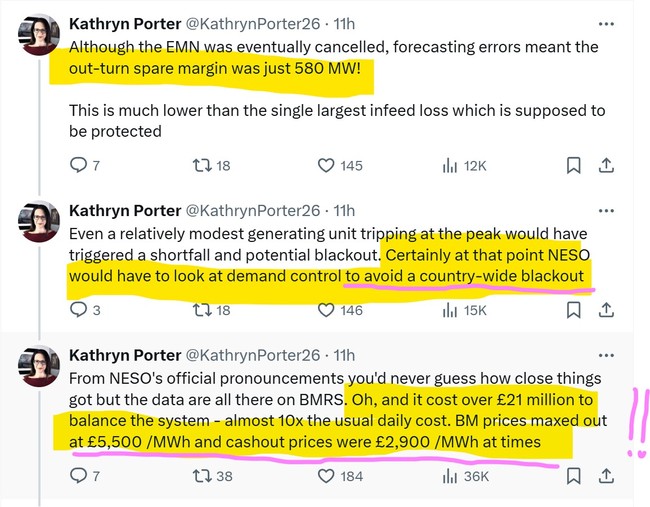We support our Publishers and Content Creators. You can view this story on their website by CLICKING HERE.
Darn, if this isn’t just all happening at the worst time. Then again, these European governments act as if ‘winter’ never happens, or if it does, it’s just a cold snap.
Advertisement
From the United Kingdom to Germany and points beyond, they are finding out that a harsher winter is too late to start scrambling for more backup power when your NetZero dreams leave you in the cold and dark.
In the renewables-addicted UK, things got hairy for grid managers yesterday and insanely expensive as they frantically bought and brought back-up power online.
Electricity demand is 46.26 GW. The UK’s 31 GW of installed wind capacity is generating 2.6 GW (6% of demand).
We’re importing twice as much electricity from abroad as wind is generating. Invest in candles. pic.twitter.com/xTE63qM9FJ
— David 🇮🇱 (@CarbonCriminal) January 8, 2025
As the wind and temperatures died away…
Just a couple of thoughts about the blackouts we missed by the skin of the teeth yesterday:
- As I noted, wind power dropped to 2.6 GW at 5.30pm. Even if wind capacity is tripled, as Miliband plans, that would still only yield about 8 GW. That extra 5 GW will probably be needed to meet increased demand. And as I have often analysed in the past, wind power can drop well below 1 GW for days on end.
…the price of keeping the grid glowing skyrocketed on the market.
We are getting more from transfers than wind at the moment…
Also..£932/MWh..!! pic.twitter.com/Kl1TSXkUuo— Knightboat (@knightboat96) January 8, 2025
£932MWh is pretty pricey juice.
And it was a very near thing, with the system for the entire country winding up with only a 580MW buffer between lights dimming and blackout after they issued an Emergency Margin Notice.
Britain’s National Energy System Operator (NESO) has cancelled an electricity margin notice it issued earlier on Wednesday calling on generators for more power to be available on the system.
“Electricity margin notice issued for the period from 1600 to 1900 hrs on Wednesday 08/01/2025 has been cancelled,” the NESO posted on the Elexon website.
Late on Tuesday, with much of Britain entering a cold weather snap, it issued an electricity margin notice for Wednesday evening. Peak electricity demand is typically in the evenings in Britain in winter.
Advertisement
Yesterday the GB power market came within 580 MW of demand control or a blackout on what was the tightest day since 2011 or before@neso_energy issued its first Electricity Market Notice of the winter and third (quickly cancelled) Capacity Market Notice
— Kathryn Porter (@KathrynPorter26) January 9, 2025
Under the system the UK operates, the ‘capacity market scheme’ power generators are paid to make sure that power is available when demand is high. In other words, step in to pick up what the renewables can’t either produce or handle, vice the old-fashioned fossil-fueled concept of just humming along, and someone cranks something up a notch or two on a dial at the plant if extra oomph is temporarily required.
So it’s nice if you have enough power generation available at the snap of a notice, but you also have to pay a premium for it. And holy smokes – did that standby generation capacity ever cost Britain a fortune last night.
That early £932MWh above?
GOOD TIMES, GOOD TIMES

£5500MWh was, at one point, the going rate to keep the country from completely going dark. Generator operators could name their price; they did, and desperate grid managers had to bite. Literally, the call went out to ‘supply at ANY COST.”
The #UK #Energy fiasco became serious last night. Wind providing just 2GW out of 45GW demand.
Call went out for supply at any cost; at one point £5.50 per Kwh (usually consumers pay c£0.27 per Kwh) was paid to a gas powered station to turn on. Also one step away from demanding…— Craig Mackinlay (@cmackinlay) January 9, 2025
…Call went out for supply at any cost; at one point £5.50 per Kwh (usually consumers pay c£0.27 per Kwh) was paid to a gas powered station to turn on. Also one step away from demanding high energy industry be turned off. This is no way to run a 21st century advanced economy. Reserve power across the grid a very shaky 500MW, just 1/6th of preferred safety margin. 5GW of steady nuclear gets turned off before the end of the decade. All the while @energygovuk wants no fossil fuel power in #Electricity network by 2030 & we’re being encouraged to make rapid power substitution to electric – #EV, #HeatPumps. Good job forecast serious weather did not arrive in the South East. When will @Ed_Miliband change course, because this one is truly dangerous?
#NetZero on this pathway does not work.
Advertisement
That’s the great green grifting renewable system in the frozen flesh.
The Grauniad was kind enough to break down what £5500MW hour looks like regarding cash in power generator pockets, and mind you – I am not begrudging the power plant operators their quick score in the least. The plants have to sit idling until called upon to fire up and save the day suddenly. It’s not like they can run at the constant, reliable, efficient hum as they used to and crank up the volume. In order to meet the erratic demands of unreliable renewables dying in and out, the deal is that utilities pay these remaining fossil fuel or coal pariahs a premium for their life-saving trouble.
This is on the Net Zero cultists, period.
So, two plants that swung into action yesterday walked away with a pretty healthy pay-off for a few hours of work.
Two gas power station owners will be paid more than £12m to supply just three hours of electricity on Wednesday evening after freezing weather led to some of the highest market prices since the energy crisis began.
Britain faced surging power prices after the grid operator warned it would need power plants to fire up in the early evening to have enough electricity to power homes and businesses within its normal safety limits.
The National Energy System Operator (Neso) – which manages the energy systems in England, Scotland and Wales – said it faced a shortfall of about 1,700 megawatts (MW), roughly the equivalent of the amount of electricity needed to power about 850,000 homes.
The electricity supply squeeze is expected to hand a windfall to the owners of two power plants in Hertfordshire, England, and Flintshire in north Wales, which will each be paid more than £6m to run their gas turbines between 4pm and 7pm when demand for electricity is forecast to reach its peak.
German utility Uniper and a subsidiary of the Swiss commodities trading giant Vitol offered to fire up their gas plants during the evening hours in exchange for “super-high” payouts of more than 50 times the market price earlier this week, according to experts.
Advertisement
Offered to ‘fire up their plants for more than 50 times the market price.’ How awful they are.
Until a rational brain kicks in and asks why you are in that situation in the first place, where you are forced to say yes.
This was just the UK last night. Europe is in very much the same boat, except they’re not an island.
But they do rely on natural gas for their emergency power, and it’s already been a surprisingly chilly winter.
They are blowing through their gas reserves, and Ukraine has let the pipeline agreement with Russia lapse that used to bring Russian natgas through that country to Europe.
Europe is rapidly depleting its gas reserves due to a harsh winter and the halt of Russian gas flows via Ukraine.
Germany faces significant economic risks due to its energy-intensive industries.
Refilling depleted gas storage during summer will be critical in the Spring of 2025.
Ah, Europe and its perennial energy conundrums. Just when you thought it was safe to turn up the thermostat, the specter of gas shortages once again knocking on Europe’s door as it depletes its natural gas reserves at an unprecedented rate. Are fears of tough times ahead unfounded?
We’ve arrived in January 2025, and Europe is burning through its gas reserves at a pace not seen in seven years.
Cold snaps have residents cranking up the heat, leading to a rapid depletion of stored natural gas. Storage levels, which were comfortably above 90% in November, have now dipped to just over 70%.
The accelerated gas drawdown, combined with the recent halt in Russian gas flows via Ukraine, has some analysts fearing the worst—disruptions.
Germany is particularly at risk in the shape they’re in.
…Germany, Europe’s industrial powerhouse, is in a particularly precarious position, and the rapid depletion of its gas reserves has led to warnings that the German economy is “acutely” at risk. Because energy-intensive industries are the backbone of its economy, any prolonged energy shortage could have severe repercussions.
Advertisement
You know, that German economy I’ve posted on plenty of times. ‘The Sick Man of Europe’ thanks specifically to their cult-induced Green renewables suicide.
That isn’t looking up, either.
Germany is experiencing its worst wave of bankruptcies since the 2008 financial crisis, with 364 major companies filing for bankruptcy in 2024; up 30% from last year. New hires has decreased, and job cuts are rising across nearly every sector. 🇩🇪(Reuters) pic.twitter.com/26bEI488dp
— Visegrád 24 (@visegrad24) January 9, 2025
Right now, Europe’s only hope is for the cold, windless winter weather to…well, I can’t say chill out, but you know what I mean. And get going with American liquid natural gas (LNG) deliveries. Those may save the day, as much as they hate having to thank Trump for them.
It will also help mitigate price spikes on the gas they do have stored.
European gas storage withdrawals are at their highest level since 2017, but fortunately there is still an above average volume in inventory. However, U.S. LNG imports to Europe will remain vital for maintaining balanced supplies. pic.twitter.com/R4oz0j5Ckz
— Richard Meyer (@RichardMeyerDC) January 8, 2025
New England and New York/New Jersey utility customers need to take a good, hard look at those UK market prices because that’s what’s coming your offshore wind farm way. That daffy governor in New York just hooked the city up for its very own wind farm THIS WEEK unless, God willing, something sticks a stake through its heart.
And it ain’t gonna be cheap even before the wind stops blowing.
New York City will soon be getting its own personal offshore wind farm. The Empire Wind 1 project just received a US$3 billion project financing package and is expected to go online in 2027, powering roughly half a million borough residents. But what’s the catch?
In the energy sector, levelized cost of energy (LCoE) is a key metric that looks at the cost of electricity generated over the lifetime of the unit generating the power. LCoE takes into consideration everything from operational costs to construction, fuel (if applicable), maintenance, output, right down to finance costs and interest payments on loans.
…NYC’s new clean energy project will cost significantly more.
Equinor, the developer behind Empire Wind 1, secured an 80,000-acre (32,375-ha) lease located 15 miles (24 km) southeast of Long Island. Along with the lease, the company locked in a contract with the New York State Energy Research and Development Authority to deliver power at a strike price of $155 per megawatt-hour over the next 25 years – nearly double the national average, and roughly the typical 20 to 25-year life expectancy for a sea-faring wind turbine. High winds, constant motion from waves, and harsh saltwater corrosion are the leading causes of shortened shelf life.
Advertisement
The contract price is already locked in at double the national average, you lucky dawgs. I can’t wait to see what the other pricing details look like.
I’d say the whole idea needs to be sleeping with the fishes if you get my drift.
But I am a cynic.

 Conservative
Conservative  Search
Search Trending
Trending Current News
Current News 







